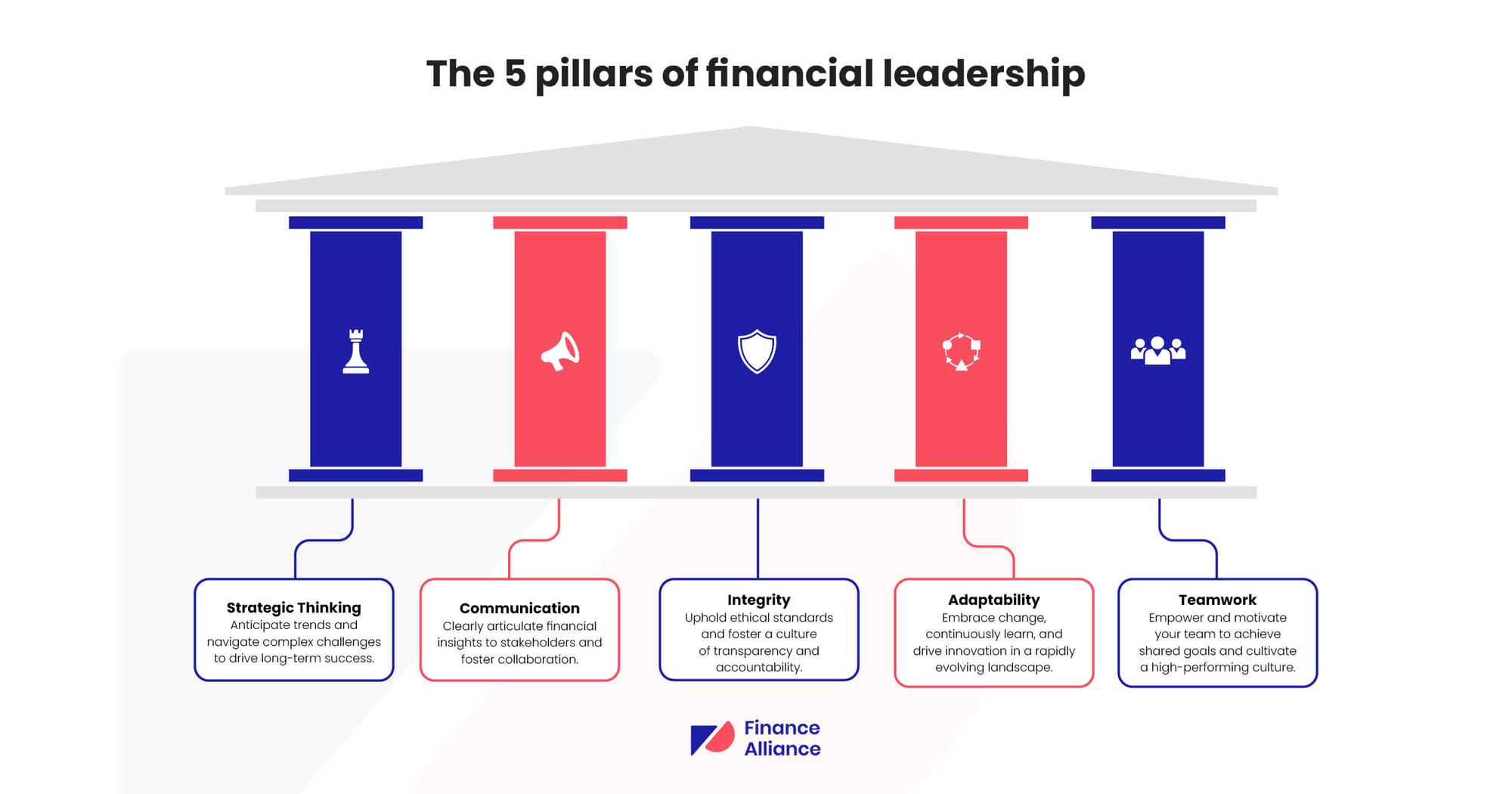CFO leadership isn’t just about flexing your financial muscles. It's also about inspiring your team, adapting to change, and navigating complex challenges.
According to IBM, CEOs view the CFO as playing the most crucial role in their organizations over the next two to three years. This means stepping into the role of leader and driving value through the organization. However, to do that effectively, CFOs must "optimize their own potential and that of their teams."
Keep reading to learn more about the five pillars of finance leadership to help you steer your team (and organization) toward success with unwavering confidence.
5 finance leadership pillars for CFOs

1. Strategic Thinking
As a CFO, you're no stranger to the importance of strategic thinking. After all, a large part of the job is about seeing the bigger picture, anticipating trends, and navigating complex challenges to drive lasting success.
Why is strategic thinking so important in CFO leadership?
Strategic thinking goes beyond numbers. It's about connecting the dots and understanding exactly how your financial decisions affect the company's goals.
By learning to think more strategically, you’ll be in a better position to offer key insights and make informed decisions to steer the company toward further growth.
How to anticipate trends and identify potential opportunities
To succeed as a CFO, you've got to keep an eye on emerging trends in your industry and the economy as a whole.
So, start making a habit of reading financial news, attending industry events, and participating in relevant discussions. This will not only help you spot potential opportunities but also prepare you to tackle any challenges that may arise.
Navigating complex challenges
No matter your profession, you're bound to come across some challenges along the way. For a CFO, one of the best ways to overcome these challenges is to approach each situation with a growth mindset.
Ask yourself, "What can I learn from this?" and "How can I turn this challenge into an opportunity?" By embracing a solutions-oriented mindset, you'll be well on your way to mastering strategic thinking as one of the most important leadership pillars.
Tips to enhance strategic thinking skills
- Create a SWOT analysis to assess your company's strengths, weaknesses, opportunities, and threats.
- Set aside time for reflection and brainstorming, allowing yourself to think creatively and explore new ideas.
- Collaborate with colleagues and mentors to gather diverse perspectives and insights.
Remember, strategic thinking is an ongoing process, so don't forget to revisit and reassess your strategies regularly. Stay open to new ideas and be prepared to adapt as needed.
2. Communication
Communication is crucial for any leader. As a CFO, it's your job to clearly articulate financial insights to stakeholders and encourage collaboration across multiple departments.
Why effective communication is so important
Effective communication is key to ensuring that your team, colleagues, and stakeholders understand your financial vision and strategy.
By improving communication skills, you can build trust, gain buy-in, and create a collaborative environment that drives success.
Communicating financial insights to stakeholders
To communicate complex financial information effectively, you must tailor your message to your audience. Focus on presenting data in a clear, concise, and visually appealing manner. You can do this by using data visualization storytelling techniques and presenting data using charts, graphs, heat maps, etc.
It's also worth remembering that stakeholders will likely want more clarity or information to help them understand the bigger picture or intent behind the data. So, make sure that you are as prepared as possible and expect to answer questions or provide additional context when needed.
Creating a collaborative culture
Encourage open dialogue and create a culture where everyone feels comfortable sharing ideas and perspectives. This will not only lead to better decision-making but also create a more inclusive and engaged work environment.
Tips to improve communication skills
- Practice active listening and ask open-ended questions to encourage conversation.
- Develop your storytelling CFO skills to make financial information more relatable and engaging.
- Use visual aids, such as graphs and charts, to simplify complex data.

3. Integrity
Integrity is the backbone of any successful CFO and one of the most important pillars of leadership. As a CFO and leader, it's up to you to uphold ethical standards and practice a culture of transparency and accountability.
The role of integrity in CFO leadership
Integrity is vital in establishing trust and credibility within your company and with external stakeholders. By acting with honesty and fairness, you'll set a positive example for your team. In turn, this will help you create a strong foundation for long-term success.
Upholding ethical standards in financial management
Make sure your organization follows all relevant laws and regulations and adheres to the highest ethical standards. This includes:
- Maintaining accurate financial records
- Conducting regular audits
- Addressing potential issues as efficiently as possible
Increasing transparency and accountability
Leading the finance team comes with a host of duties including building a culture of transparency and accountability. To do this, you could start by encouraging open communication and providing regular updates on financial performance, goals, and challenges. Hold yourself and your team accountable for your actions, and always be willing to learn from mistakes and grow.
Tips and tools to maintain and promote integrity in the workplace
- Develop and implement a code of ethics for your organization.
- Provide regular training on ethical conduct and compliance.
- Establish clear reporting mechanisms for employees to voice concerns or report misconduct.
4. Adaptability
In today's rapidly evolving financial landscape, CFOs must embrace change, continuously learn, and drive innovation.
Embracing change
Change is inevitable, and as a CFO, it's important to stay agile and adapt to new trends, technologies, and challenges.
By being open to change, you'll be better prepared to capitalize on emerging opportunities and steer your organization through uncertain times.
Continuous learning and development
Never stop learning! Invest in your personal and professional growth by attending workshops, conferences, and online courses. This will not only help you stay current with industry trends but also enable you to bring fresh insights and ideas to your organization.
Driving innovation
As a leader, it's your responsibility to create an environment where innovation thrives. Encourage your team to think creatively and take calculated risks, and be prepared to challenge the status quo when needed.
Tips to enhance adaptability and resilience
- Stay informed about industry trends and emerging technologies by subscribing to relevant publications, blogs, and podcasts.
- Encourage a culture of experimentation and learning from failures within your organization.
- Develop a strong network of peers and mentors to exchange ideas and best practices.

5. Teamwork
Teamwork is one of the most important CFO leadership pillars. Therefore, it's crucial to empower and motivate your team to achieve shared goals and cultivate a high-performing culture.
Why teamwork is so important
Teamwork is essential for driving your company's financial success. By cultivating a cooperative culture, you can harness the combined expertise and talents of your finance team. This collaboration will allow you to make more informed decisions, develop better strategies, and ultimately reach your financial objectives.
Empowering and motivating your team to achieve shared goals
Create a supportive and inclusive environment where team members feel valued and inspired to contribute their best. Set clear expectations and provide the necessary resources, guidance, and feedback to help your team succeed.
Tips to improve teamwork and team management skills
- Develop strong relationships with your team members by investing time in one-on-one meetings and team-building activities.
- Set clear, measurable, and achievable goals for your team and regularly track progress.
- Foster a growth mindset by providing opportunities for professional development and skill-building.
And there you have it! By mastering these 5 CFO leadership pillars, you'll be well-equipped to lead your organization toward financial success.
Embrace strategic thinking, effective communication, integrity, adaptability, and teamwork to truly elevate your CFO leadership game.
FAQs - Pillars of leadership
What is the CFO role in leadership?
The CFO plays a critical leadership role in an organization by overseeing financial management, providing strategic direction, and ensuring long-term financial stability. Additionally, a CFO contributes to the overall decision-making process, collaborates with other senior leaders, and communicates financial insights to stakeholders.
How can a CFO balance their financial responsibilities with their leadership role?
Balancing financial responsibilities with leadership involves prioritizing tasks, delegating when appropriate, and ensuring open communication with team members and stakeholders. A CFO should focus on both the strategic and operational aspects of financial management while also nurturing a positive, collaborative work environment that supports the professional growth of their team.
How does a CFO's leadership style impact the organization?
A CFO's leadership style can significantly impact the organization's financial performance, employee engagement, and overall culture. Effective CFO leadership fosters collaboration, innovation, and a solutions-oriented mindset, ultimately driving the organization towards its financial goals and long-term success.
What are some common challenges CFOs face in their leadership role, and how can they overcome them?
Common challenges for CFOs in their leadership role include managing change, ensuring compliance, navigating complex financial situations, and maintaining a work-life balance. To overcome these challenges, CFOs should stay informed about industry trends, invest in their personal and professional development, collaborate with peers and mentors, and prioritize self-care and stress management.




 Follow us on LinkedIn
Follow us on LinkedIn




